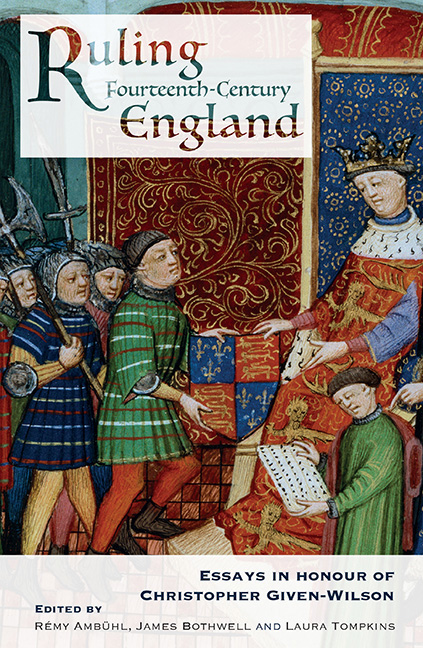Book contents
- Frontmatter
- Contents
- Contributors
- Abbreviations
- Introduction
- The Efficiency of English Royal Administration in the Last Years of Edward I
- Government and Market in the Early Fourteenth Century
- Kings' Clerks: The Essential Tools of Government
- Edward II: Favourites, Loyalty and Kingship
- The Perils of Lordship: The Life and Death of William Tuchet (c. 1275–1322)
- ‘War’, ‘Rebellion’ or ‘Perilous Times’? Political Taxonomy and the Conflict in England, 1321–2
- The Carlisle Roll of Arms and the Political Fabric of Military Service under Edward III
- What's in a Title? Comital Development, Political Pressures and Questions of Purpose in Fourteenth-Century England
- Edward the Black Prince: Lordship and Administration in the Plantagenet Empire
- ‘Said the Mistress to the Bishop’: Alice Perrers, William Wykeham and Court Networks in Fourteenth-Century England
- The Politics of Surrender: Treason, Trials and Recrimination in the 1370s
- Richard II in the Mirror of Christendom
- Bibliography
- Index
- Tabula Gratulatoria
Kings' Clerks: The Essential Tools of Government
Published online by Cambridge University Press: 18 September 2019
- Frontmatter
- Contents
- Contributors
- Abbreviations
- Introduction
- The Efficiency of English Royal Administration in the Last Years of Edward I
- Government and Market in the Early Fourteenth Century
- Kings' Clerks: The Essential Tools of Government
- Edward II: Favourites, Loyalty and Kingship
- The Perils of Lordship: The Life and Death of William Tuchet (c. 1275–1322)
- ‘War’, ‘Rebellion’ or ‘Perilous Times’? Political Taxonomy and the Conflict in England, 1321–2
- The Carlisle Roll of Arms and the Political Fabric of Military Service under Edward III
- What's in a Title? Comital Development, Political Pressures and Questions of Purpose in Fourteenth-Century England
- Edward the Black Prince: Lordship and Administration in the Plantagenet Empire
- ‘Said the Mistress to the Bishop’: Alice Perrers, William Wykeham and Court Networks in Fourteenth-Century England
- The Politics of Surrender: Treason, Trials and Recrimination in the 1370s
- Richard II in the Mirror of Christendom
- Bibliography
- Index
- Tabula Gratulatoria
Summary
All machines need lubrication. In the fourteenth century lubrication of the machinery of government was provided by kings’ clerks. The existence and usefulness of this cadre of men were so ubiquitous that they can be overlooked in consequence, and, further, today's secular attitude tends to relegate anyone in holy orders (‘clergymen’) to a scholarly sideline. The fourteenth century was the golden age of kings’ clerks, for the great leap forward of administration under Edward I created the need for more of such men, while in the fifteenth century the proportion of ordained clerks in crown service declined as the numbers of laymen rose. Though there were some lay clerks during the fourteenth century, it was in the second quarter of the fifteenth that the balance tipped towards laymen. The process was perhaps accelerated by Henry V's promotion of English as a language of government, while later in the century there was, it has been argued, a policy of ‘dumbing down’ the personnel of government bureaucracy. The magisterial work of T. F. Tout told us much about many kings’ clerks, but its essential concern lay with the organs of crown administration. The purpose of this essay is to focus on the men themselves, to remind readers of some of the essential roles played by kings’ clerks operating the machinery of royal power and to suggest other possible contributions they made to society.
We must remember that ‘king's clerk’ was a usefully elastic title; men could move into and out of crown service, enjoying the ‘portfolio careers’ which will (we are told) characterise twenty-first-century employment. This was especially the case with those who had a university education; the volumes compiled by Dr Emden abound in biographies of men whose main careers were in diocesan administration or ecclesiastical law, but who were on occasion described as ‘king's clerk’. Some may have changed jobs in mid-career, but others were recruited for particular tasks, especially those requiring legal or diplomatic expertise. The most famous of these ‘casuals’ was John Wycliffe, who was employed as a propagandist and diplomat. Wycliffe described himself as ‘in a special sense a king's clerk’, though his diplomacy was short-lived.
- Type
- Chapter
- Information
- Ruling Fourteenth-Century EnglandEssays in Honour of Christopher Given-Wilson, pp. 59 - 76Publisher: Boydell & BrewerPrint publication year: 2019



